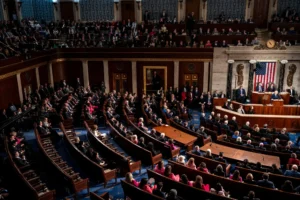Congress Returns Amid High Stakes: Urgent Budget and Tax Proposals Set to Reshape America’s Future as lawmakers face a critical moment that will decide how America’s economy, families, and businesses are impacted for the next decade.
Why Congress’s Budget and Tax Proposals Matter More Than Ever
When Congress returned this week, the urgency around the 2025 budget and new tax proposals was immediate. These decisions could either strengthen or weaken America’s economy at a time when inflation, debt, and global competition are rising sharply.
Experts warn that without quick action, American families could face higher taxes, reduced federal benefits, and slower economic growth by 2026. According to the Congressional Budget Office (CBO), without intervention, the federal deficit could reach $2 trillion annually by 2026.
Main Highlights: What Are the Key Budget and Tax Proposals?
Here’s a simplified Map for better understanding:
[2025 Budget & Tax Proposals]
|
------------------------------------------------------
| | |
Tax Cuts Extension New Tax Breaks Federal Spending Changes
| | |
- Extend 2017 Tax Act - No tax on tips, overtime - Medicaid cuts
- Avoid 2026 hikes - No tax on Social Security - Cut green energy subsidies
Details in Table Form:
| Proposal Focus | Main Idea |
|---|---|
| Tax Cuts Extension | Continue 2017 Tax Act benefits, preventing tax hikes in 2026. |
| Elimination of Certain Taxes | Remove taxes on tips, overtime, and Social Security benefits. |
| Medicaid Spending Reductions | Propose significant cuts to Medicaid to curb federal deficit growth. |
| Green Energy Incentives Cut | Roll back subsidies to reduce government spending. |
| Corporate Tax Reforms | Adjust corporate taxes to boost U.S. business competitiveness. |
How These Changes Will Affect Americans: Winners and Losers
If Passed:
- Middle-Class Workers: Benefit from tax savings but may pay more for healthcare.
- Business Owners: Enjoy reduced payroll costs but face uncertain regulatory changes.
- Low-Income Families: Risk losing Medicaid or facing higher healthcare expenses.
If Rejected:
- Tax Hikes: Automatic tax increases starting 2026.
- Government Programs: Continued heavy spending with growing national debt.
A CBO estimate shows that extending all 2017 tax cuts without offsetting revenue would add $4.5 trillion to the national debt over 10 years.
Party Positions: What Republicans and Democrats Are Fighting For
| Political Party | Position on Budget and Taxes |
|---|---|
| Republicans | Extend tax cuts, shrink government, grow the economy. |
| Democrats | Balance targeted tax relief with tax hikes for wealthiest Americans. |
Key Quotes:
- Mitch McConnell: “We must protect hardworking families from rising taxes.”
- Chuck Schumer: “Tax breaks must not favor only the wealthy at the expense of everyday Americans.”
Both sides agree on urgency but clash on how to fund or structure the relief.
Timeline: When Will Americans Feel the Impact?
| Date | Milestone |
|---|---|
| May 2025 | Committee markups on budget and tax proposals. |
| June–July 2025 | Congressional debates and amendments. |
| August 2025 | Expected initial voting sessions. |
| September 30, 2025 | Final budget deadline to prevent shutdown. |
If Congress fails to pass a budget, America faces the risk of a federal shutdown right before critical tax decisions kick in.
Deep Dive: Real Data on Why the Budget Debate Is Critical
| Key Statistic | Value |
|---|---|
| Current Federal Deficit | $1.8 trillion (2024) |
| Projected Deficit by 2026 | $2.0 trillion annually |
| Cost of Extending Tax Cuts | $4.5 trillion over 10 years |
| Expiry of Tax Cuts | 2026 |
| Medicaid Enrollment (2024) | 84 million Americans |
Note: Medicaid cuts alone could affect over 25% of the U.S. population.
How These Proposals Will Reshape America’s Economic Future
- Economic Growth: Tax relief might boost spending and investment short-term.
- Debt Burden: Larger deficits may raise interest rates and hurt future generations.
- Healthcare Access: Medicaid cuts could leave millions uninsured.
- Income Inequality: Tax policy will define whether economic gaps widen or narrow.
The 2025 decisions won’t just impact today—they will affect America’s global competitiveness, the strength of the U.S. dollar, and how future crises are handled.
Conclusion: The Budget Battle That Will Define America’s Next Decade
Congress’s choices in the coming months are more than just fiscal decisions—they represent a crossroads for America’s values, economic priorities, and future prosperity.
Whether the focus remains on growth through tax cuts or a balanced approach with new revenue streams, the outcome will impact every American household.
Quick Data Recap:
- Budget Deficit already at $1.8 trillion.
- Medicaid cuts could affect 84 million Americans.
- Tax Cuts extension cost: $4.5 trillion over 10 years.
Staying informed is crucial as these policies take shape.
[USnewsSphere.com / tf.]





